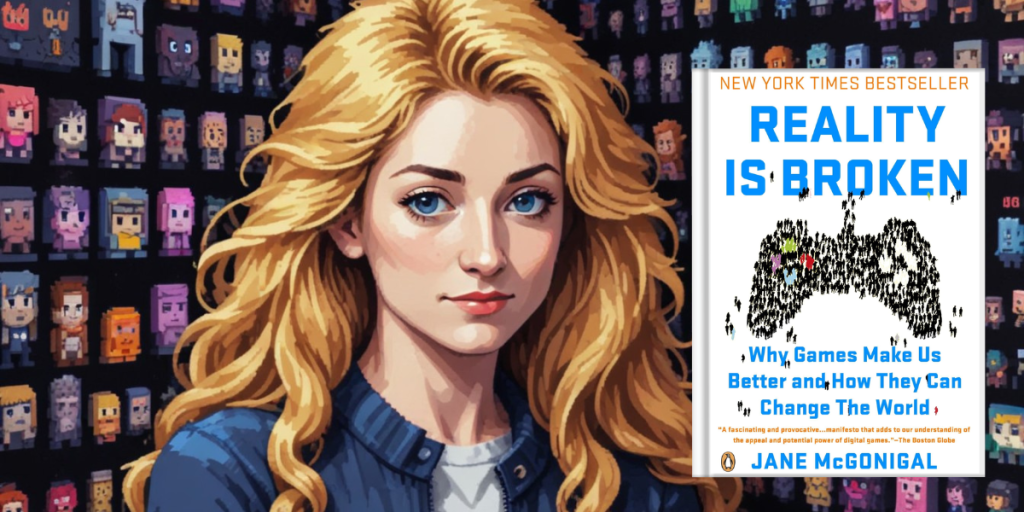
Every week, we will suggest a book that can help you as a developer, player, or enthusiast about video gaming to learn about the power of this industry, which generates more than 180 billion dollars in revenue yearly.
This week, we recommend the book ‘Reality is Broken: Why Games Make Us Better and How They Can Change the World’ by Jane McGonigal, which explores the positive impact of games on our lives. This thought-provoking exploration by renowned game designer and researcher Jane McGonigal delves into the transformative power of games. ‘Reality is Broken‘ challenges conventional gaming notions, offering insights into how games can enhance motivation, promote collaboration, and address real-world challenges. Join us on a journey through the fascinating intersection of play and society as we explore the potential for gaming to inspire positive change in our lives and communities.
“Reality is Broken” by Jane McGonigal is a groundbreaking exploration of gaming and its potential to positively impact society. McGonigal, a game designer and researcher, argues that games can make us better individuals and address real-world problems in innovative ways.
The book begins by challenging the common perception of games as mere entertainment and escapism. Instead, McGonigal asserts that games fulfill essential human needs for engagement, achievement, and social connection. She introduces the concept of “gamefulness,” which refers to the mindset cultivated by games—characterized by a sense of purpose, optimism, and resilience.
One of the book’s central arguments is that games provide a structured environment that is inherently motivating and fulfilling. Unlike many real-world activities, games offer clear goals, immediate feedback, and a sense of progress, which can enhance motivation and engagement. McGonigal suggests that by understanding and harnessing the principles of game design, we can apply them to various aspects of life to improve productivity, creativity, and well-being.
McGonigal explores the psychological benefits of gaming, citing research that shows how games can reduce stress, improve mood, and enhance cognitive abilities such as problem-solving and creativity. She challenges the negative stereotypes associated with gaming, highlighting its potential to promote positive emotions and social connections.
Furthermore, McGonigal discusses the power of collective action in gaming communities. She illustrates how online multiplayer games often require cooperation and collaboration among players to achieve common objectives. Drawing parallels to real-world challenges, McGonigal suggests that the same principles of teamwork and coordination observed in games can address complex problems like climate change, poverty, and healthcare.
The concept of “gamification” emerges as a critical theme in the book. McGonigal defines gamification as integrating game design principles into non-game contexts to engage and motivate individuals. She presents numerous examples of gamification in education, fitness, and business to incentivize behavior change and drive positive outcomes.
One of the most compelling aspects of “Reality is Broken” is its exploration of the potential for social transformation through gaming. McGonigal envisions a future where gameful thinking permeates all aspects of society, leading to greater collaboration, creativity, and resilience. She argues that tapping into the inherent human desire for play can create a more inclusive, equitable, and sustainable world.
Throughout the book, McGonigal emphasizes the importance of designing games and gamified experiences that align with core human values and aspirations. She cautions against the misuse of gamification for manipulative or exploitative purposes, stressing the need for ethical considerations and user empowerment.
In conclusion, “Reality is Broken” presents a compelling case for games’ transformative potential. McGonigal invites readers to reconsider their perceptions of gaming and recognize its capacity to inspire positive change on both individual and societal levels. By embracing gamefulness and applying game design principles to real-world challenges, we can harness the power of play to create a brighter future for ourselves and future generations.
Here are five powerful points from “Reality is Broken: Why Games Make Us Better and How They Can Change the World” by Jane McGonigal:
- Games as a Source of Meaning: McGonigal argues that games provide a sense of purpose and meaning often lacking in everyday life. They offer clear goals, immediate feedback, and a sense of progress, which can enhance motivation and engagement.
- Harnessing the Power of Collective Action: The book explores how games can mobilize large groups of people to work together towards common goals. McGonigal cites examples of online gaming communities collaborating to solve complex problems or contribute to scientific research.
- Gamification for Real-World Challenges: McGonigal advocates using game design principles, known as “gamification,” to address real-world problems such as education, healthcare, and environmental sustainability. By incorporating elements like competition, rewards, and social interaction, gamification can motivate behavior change and foster positive outcomes.
- The Psychological Benefits of Gaming: Contrary to stereotypes, McGonigal presents research showing that gaming can have numerous psychological benefits, including stress reduction, improved mood, and enhanced cognitive abilities such as problem-solving and creativity.
- The Potential for Social Transformation: Finally, the book explores the broader implications of gaming for society, suggesting that by tapping into the inherent human desire for play, we can create a more collaborative, resilient, and fulfilling world. McGonigal envisions a future where gameful thinking is applied to solve some of the most pressing global challenges.
We also recommend that you discover the exhilarating insights of renowned game designer and researcher Jane McGonigal in her captivating TED Talk, “Gaming Can Make a Better World.”
In her presentation, McGonigal discusses how gaming can solve real-world problems and create positive social change. She shares examples of how games can encourage people to work together, build resilience, and find purpose. With her energetic attitude and innovative ideas, McGonigal encourages people to consider the potential of games in creating a better future. Get inspired and empowered as you learn how gaming can improve the world.
